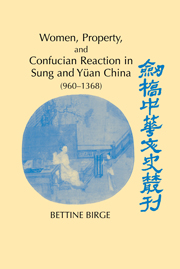Book contents
- Frontmatter
- Contents
- List of Maps, Figures, and Tables
- Chronology of Chinese Dynasties
- Abbreviations
- Acknowledgments
- Introduction
- 1 Women and Property before the Sung: Evolution and Continuity
- 2 Women and Property in the Sung: Legal Innovation in Changing Times
- 3 Women's Property and Confucian Reaction in the Sung
- 4 Transformation of Marriage and Property Law in the Yüan
- Conclusion: Gender, Mongols, and Confucian Ideals
- Bibliography
- Glossary-Index
4 - Transformation of Marriage and Property Law in the Yüan
Published online by Cambridge University Press: 24 August 2009
- Frontmatter
- Contents
- List of Maps, Figures, and Tables
- Chronology of Chinese Dynasties
- Abbreviations
- Acknowledgments
- Introduction
- 1 Women and Property before the Sung: Evolution and Continuity
- 2 Women and Property in the Sung: Legal Innovation in Changing Times
- 3 Women's Property and Confucian Reaction in the Sung
- 4 Transformation of Marriage and Property Law in the Yüan
- Conclusion: Gender, Mongols, and Confucian Ideals
- Bibliography
- Glossary-Index
Summary
Whereas Huang Kan and other adherents of the Learning of the Way in the Southern Sung objected to the strong rights to property that Sung women enjoyed, it is unlikely that Huang's ideas would have seriously affected women's property rights, had it not been for the upheaval of the Mongol conquest of North and then South China in the thirteenth century. This historic event exposed the Chinese to the very different social practices of Mongols and other non-Han peoples, and challenged fundamental moral and legal principles governing marriage and the family. In the space of a century after Huang Kan's death, from the 1230s to the 1330s, laws and practices concerning women, marriage, and property changed dramatically. Under the Yüan dynasty the confrontation between Mongol and Chinese civilization ironically created the conditions for the adoption of laws supporting many of the ideas of Huang Kan and the Chu Hsi school, that redefined women's places in the family and changed women's relation to property. Huang Kan's three admonitions to widows: (1) to stay chaste; (2) to stay and serve in the husband's household; and (3) to relinquish control of personal property, all gained legal support for the first time. The pages below will demonstrate that this resulted not from direct Mongol influence, but from a complicated interplay between indigenous Chinese controversies, described in the previous chapters, and Mongol efforts to preserve and adapt their laws and customs while effectively governing a multiethnic society.
- Type
- Chapter
- Information
- Publisher: Cambridge University PressPrint publication year: 2002

